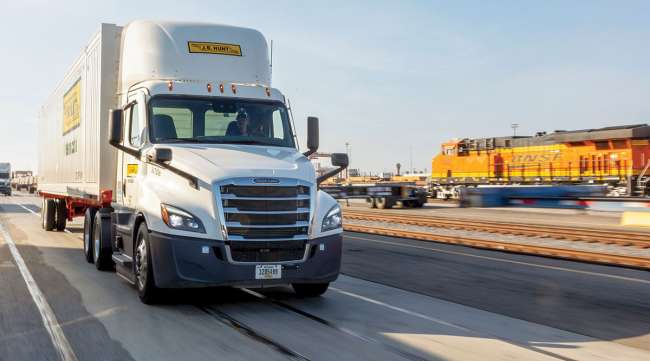J.B. Hunt posted net earnings of $117.7 million in Q1, compared with $127.5 million during the same time the previous year. (J.B. Hunt Transport Services)
J.B. Hunt Transport Services reported a slight decline in revenue as segment results dragged down top-line numbers during the first quarter of 2025, the company reported April 15.
The Lowell, Ark.-based carrier posted net earnings of $117.7 million, or $1.17 a diluted share, for the three months ending March 31. That compared with $127.5 million, $1.22, during the same time the previous year. Total operating revenue decreased 1% to $2.92 billion from $2.94 billion.
Truckload segment revenue decreased 7% to $167 million from $178 million during the same time last year. This was because of a 6% decline in revenue per load that was partially offset by a 2% increase in load volume. Total average effective trailer count decreased by about 6% versus the prior-year period. But operating income was up 66% to $2 million from $1.23 million. This was driven primarily by better safety results, a more balanced network and an overall continued focus on cost management and productivity.
Final Mile Services segment revenue decreased 12% to $201 million from $229 million. The decrease was driven mainly by general weakness in demand across many of the end markets the company serves. The decline in revenue was modestly offset by improved revenue quality at underperforming accounts and new customer contracts. Operating income was down 69% to $4.7 million from $15.1 million. This was driven by lower revenue and higher insurance costs. The prior year also included a $3.1 million benefit from a claim settlement. This was partially offset by lower personnel-related costs and facility rental expense.
Q1 2025 Earnings Press Release
Integrated Capacity Solutions segment revenue was down 6% to $268 million from $285 million. The report noted that overall segment volume decreased 13% versus the prior-year period. But revenue per load increased 8% due to higher contractual and transactional rates as well as changes in customer freight mix. The segment also reported an operating loss of $2.7 million, compared with a loss of $17.5 million during the prior year. The small loss was attributed to lower personnel-related and cargo claims expenses, reduced technology costs and a reduction in acquisition-related integration and transition costs.
Dedicated Contract Services segment revenue declined 4% to $822 million from $860 million. This was driven by a 5% decline in average truck count that was partially offset by a 2% increase in productivity. There were 630 fewer revenue-producing trucks in the fleet by the end of the quarter compared to the prior-year period. Operating income was down 14% to $80.3 million from $93.7 million. The decrease was primarily driven by the lower revenue versus increased costs for insurance, medical costs and equipment.
Intermodal segment revenue increased 5% to $1.47 billion from $1.40 billion. The report noted that overall demand for the company’s domestic intermodal service offering remained strong, delivering the highest first-quarter volume in J.B. Hunt’s history. The company saw notable strength in its eastern network. Revenue per load was down 1% year over year, while operating income was down 7% to $94.4 million from $101.1 billion. This was primarily because of lower yields combined with increases in driver and nondriver wages, higher insurance costs, increased group medical costs and higher equipment storage costs.
J.B. Hunt ranks No. 3 on the Transport Topics Top 100 list of the largest for-hire carriers in North America, No. 2 on the truckload/dedicated sector list and No. 1 in the intermodal/drayage segment. It also ranks No. 4 on the TT Top 100 list of the largest logistics companies.






